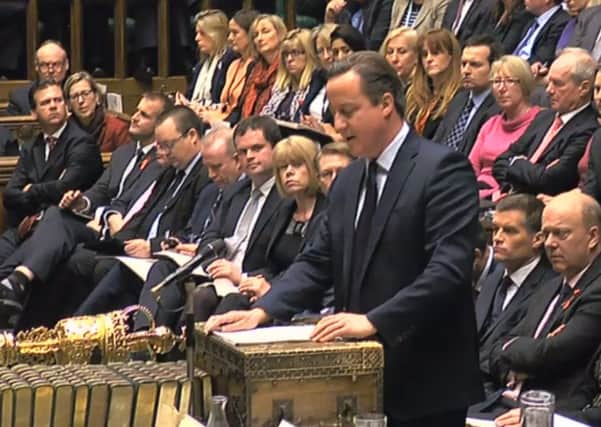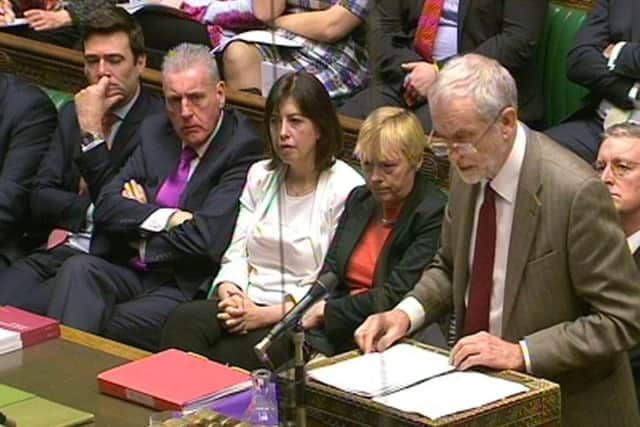David Cameron appeals for MPs to back Syrian airstrikes


In the wake of the Paris terror attacks, the Prime Minister argued that it was “morally” unacceptable to leave the US, France and other allies to carry the burden without British support and asked: “If not now, when?”
Mr Cameron argued there was strong legal justification for extending the current military action in Iraq into Syria, on grounds of self-defence and a recent UN Security Council resolution.
Advertisement
Hide AdAdvertisement
Hide AdIn a statement to the House of Commons, Mr Cameron admitted that IS could not be defeated by airstrikes alone.


But he argued that it was a key part of a wider “comprehensive” strategy to deal with the threat. of a wider “comprehensive” strategy to deal with the threat.
Military action would be supported by diplomatic measures to achieve a change of regime with the ultimate goal of removing the Syrian dictator prime minister Bashar al-Assad.
Mr Cameron did not specify a timetable for a House of Commons vote on airstrikes but indications are that it could be held within a week.
But he said the issue would not be put to MPs until he could command a “clear majority”, arguing that a Commons defeat would be a “publicity coup” for IS.
In the Commons, the SNP and the Lib Dems indicated they would not support extending military action.
With some Conservative MPs expressing reservations about the action and Mr Cameron having a working majority of just 16, government whips will have to calculate how many Labour MPs are prepared to support the Prime Minister.
Up to 100 Labour MPs are thought to be supportive of Mr Cameron, although party leader Jeremy Corbyn has said he opposes conflict.
Advertisement
Hide AdAdvertisement
Hide AdLast night Mr Corbyn wrote to his MPs to tell them he still opposes airstrikes in Syria following Mr Cameron’s announcement.
He said the shadow cabinet met yesterday and would meet again on Monday, “when we will attempt to reach a common view”.
Mr Corbyn wrote: “I do not believe the Prime Minister’s current proposal for airstrikes in Syria will protect our security and therefore I cannot support it.”
Also last night Russian president Vladimir Putin confirmed his country is ready to cooperate with the US-led coalition fighting IS.
Mr Putin said after talks with French president Francois Hollande that Russia is open to closer co-operation with both France and the US-led coalition on selecting IS targets. He added that Assad’s fate should be decided by people in his country and called the Syrian army a “natural ally” of any international coalition fighting IS.
Earlier Mr Cameron made the case for conflict saying: “The reason for acting is the very direct threat that Isil poses to our country and our way of life.
“They have already taken the lives of British hostages and inspired the worst terrorist attack against British people since 7/7 on the beaches of Tunisia.”
Mr Cameron said seven attacks over the past year had been linked to Isis or inspired by its propaganda.
Advertisement
Hide AdAdvertisement
Hide Ad“I am in no doubt that it is in our national interest to stop them. And stopping them means taking action in Syria, because it is Raqqa that is their headquarters,” he said.
He added: “We shouldn’t be content with outsourcing our security to our allies. If we won’t act now, when our friend and ally France has been struck in this way, then our friends and allies can be forgiven for asking: if not now, when?”
When questioned by Mr Corbyn, the prime minister ruled out sending in British troops saying: “We are not deploying British combat forces, we’re not going to deploy British combat forces. We think actually the presence of western boots on the ground in that way would be counter-productive.
“That is one of the things I think we’ve all collectively, across the House, learnt from previous conflicts and we don’t want to make that mistake again.”
Mr Cameron said it was his assessment that there are around 70,0000 Syrian opposition fighters who do not belong to extremist groups.
This was questioned by some Conservative MPs. Defence committee chairman Julian Lewis said: “Airstrikes alone will not be effective, they have to be in co-ordination with credible ground forces.
“The suggestion there are 70,000 non-Islamist, moderate, credible ground forces, I have to say, is a revelation to me and I suspect most other MPs in this House. Adequate ground forces, in my view, depend on the participation of the Syrian Army.”
While the former Conservative minister Peter Lilley said: “I want you to convince me that what you refer to as the Free Syrian Army actually exists rather than is a label we apply to a rag-bag group of clans and tribal forces with no coherent force.
Advertisement
Hide AdAdvertisement
Hide Ad“I’d like you to convince me there is a moderate group we can back whereas in times of constitutional dissolution it is almost a law of human nature that people rally to the most extreme and forceful advocate of their group - there are no moderates.”
Mr Cameron replied: “The truth is there are moderate forces, there are the forces of the Free Syrian Army.”